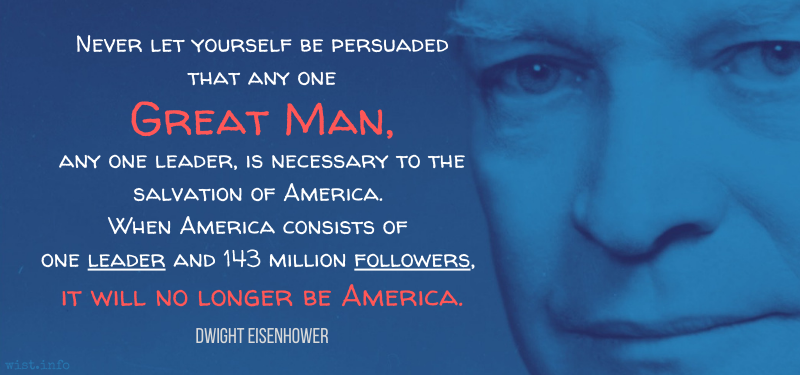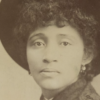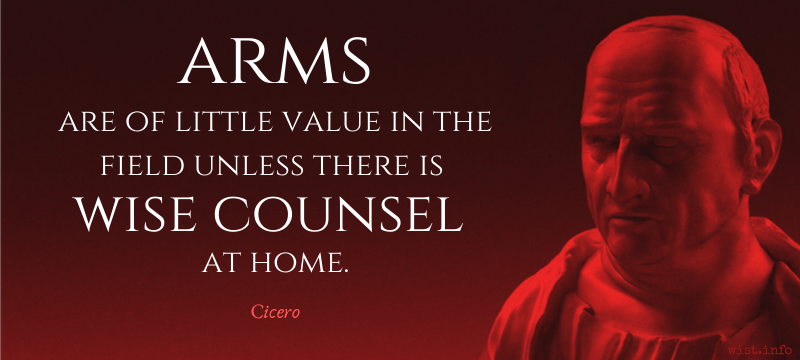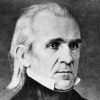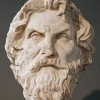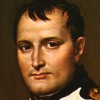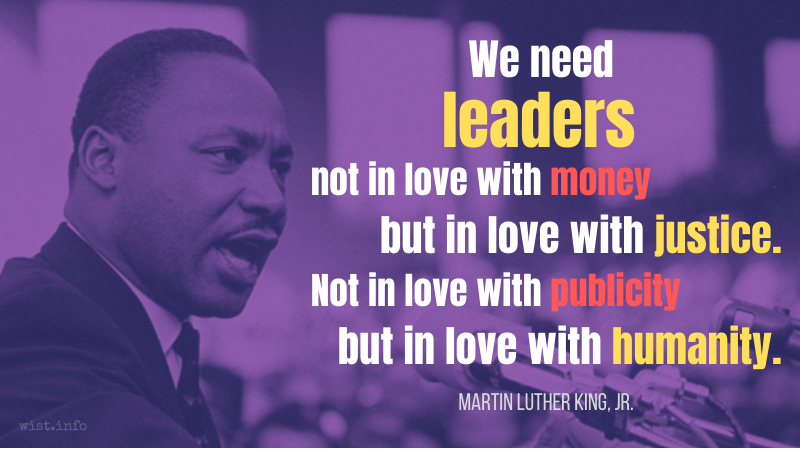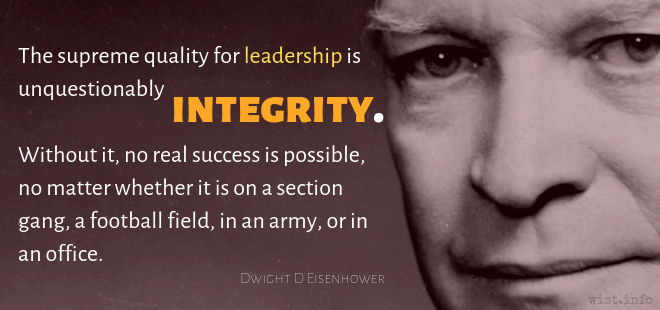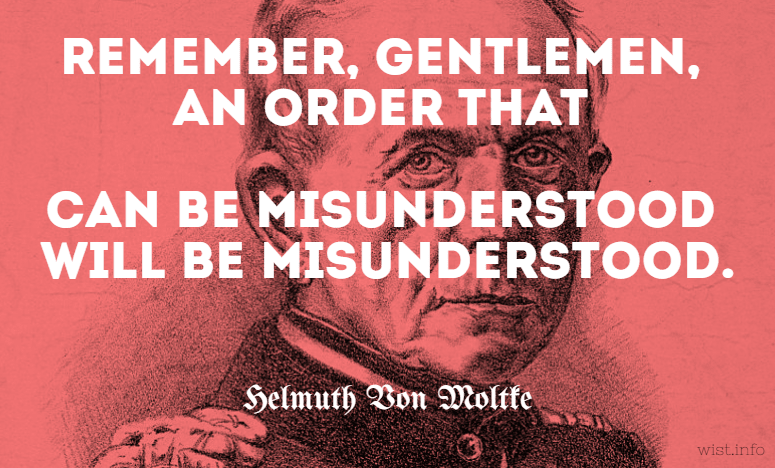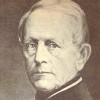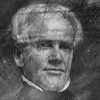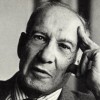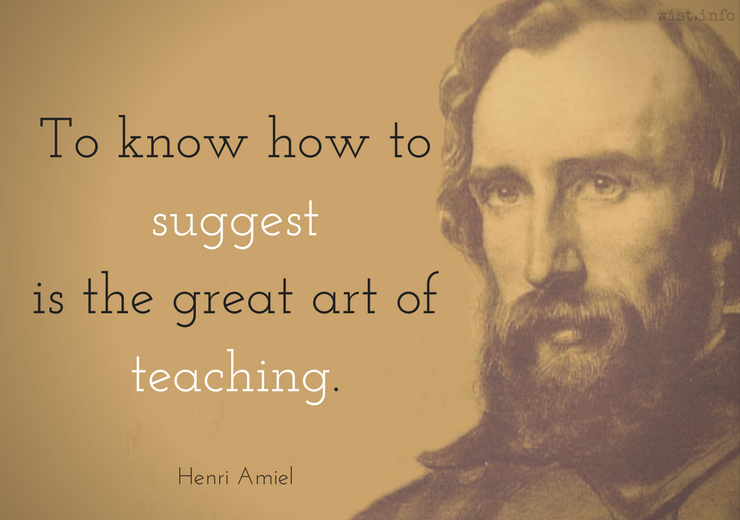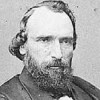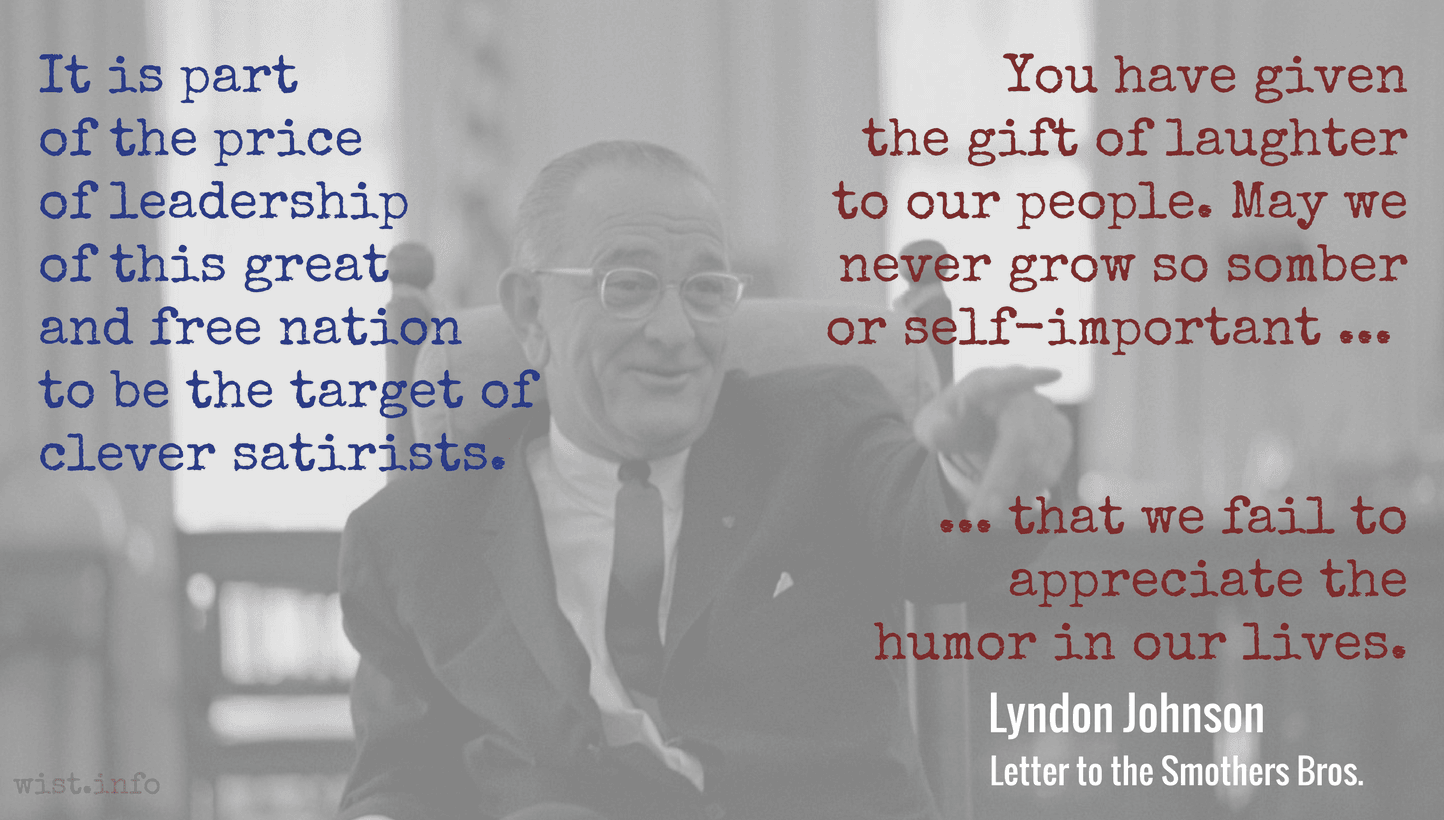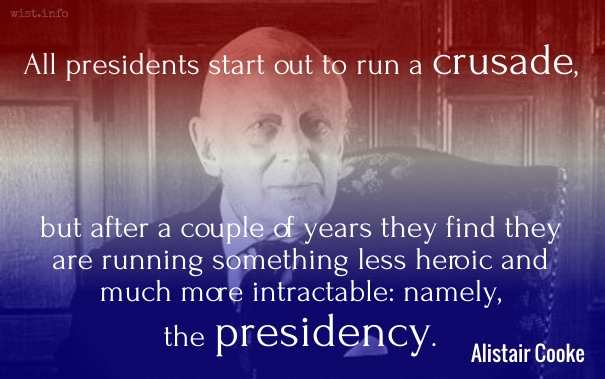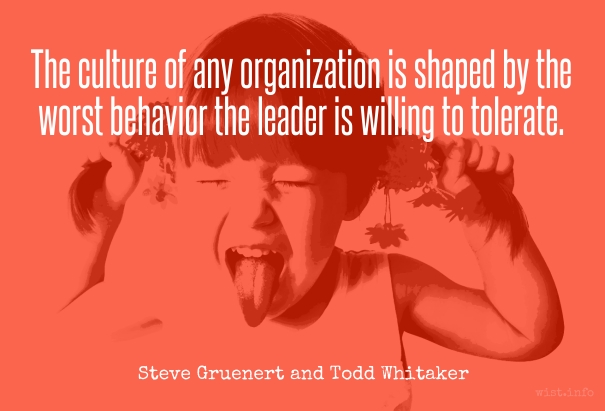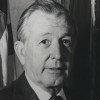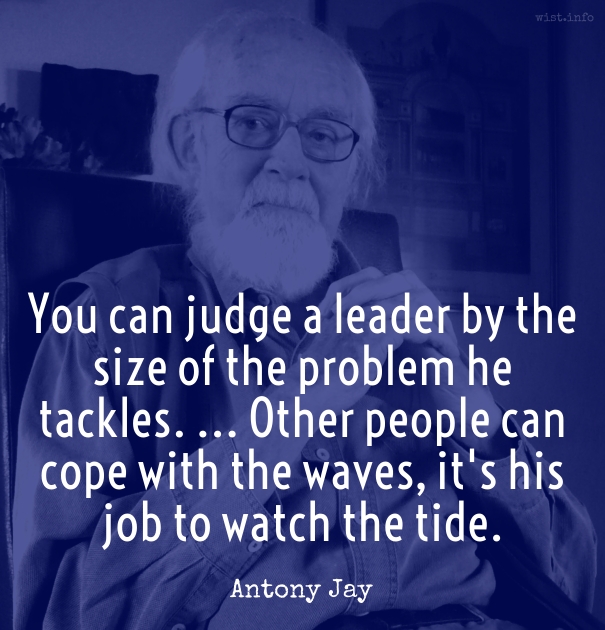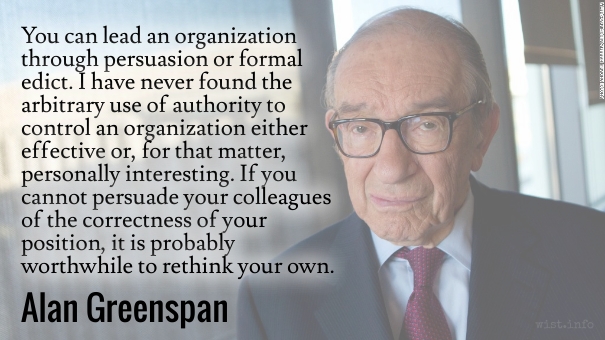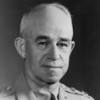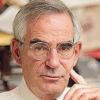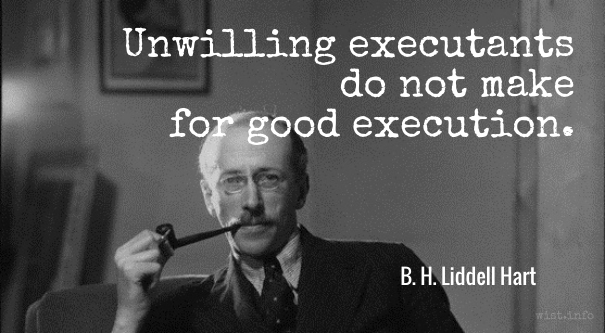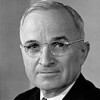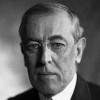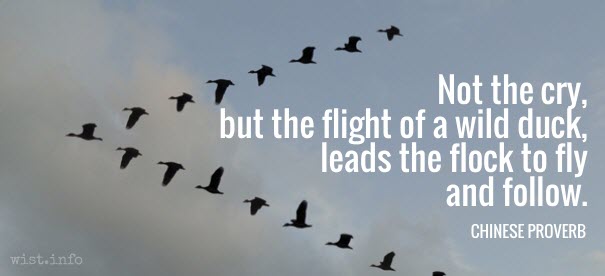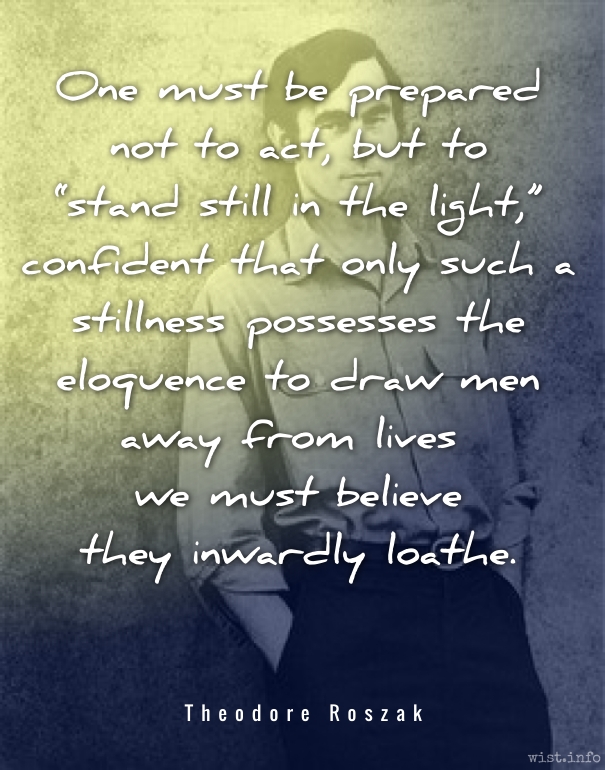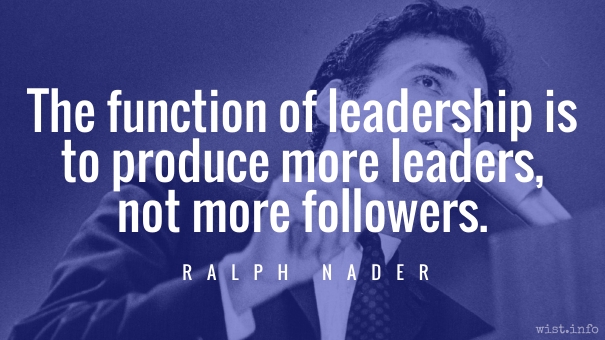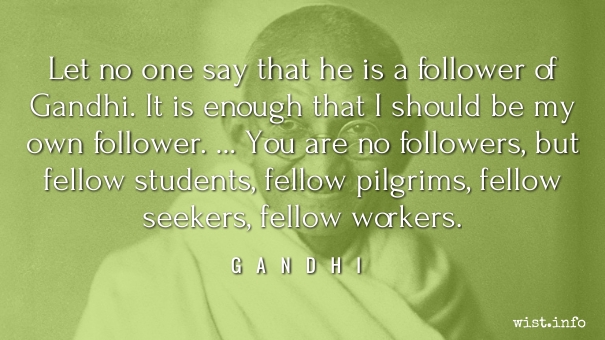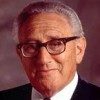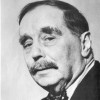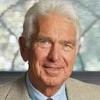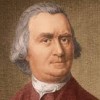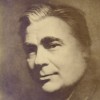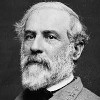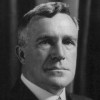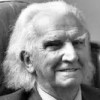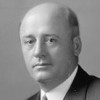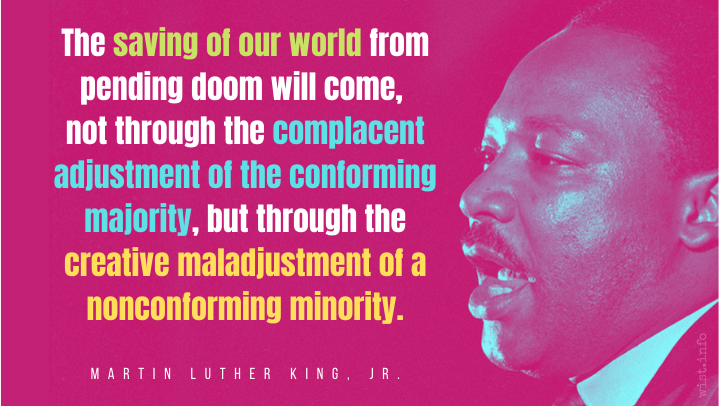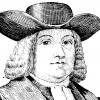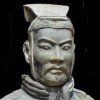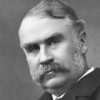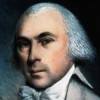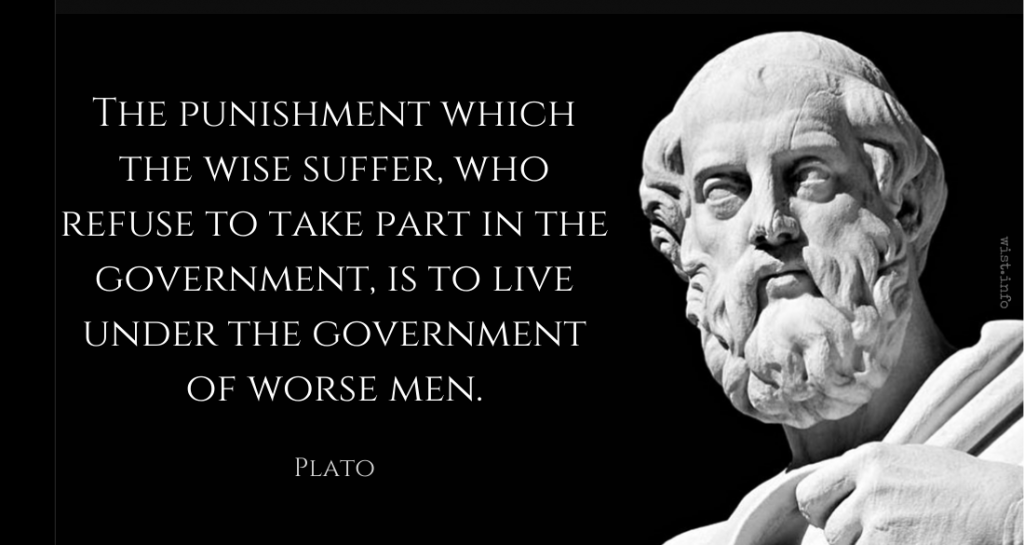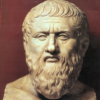THE DOCTOR: But you can’t rule the world in hiding. You’ve got to come out on the balcony sometimes and wave a tentacle, if you’ll pardon the expression.
Robert Banks Stewart (1931-2016) Scottish screenwriter, television producer, journalist
Doctor Who (1963), 13×01 “Terror of the Zygons,” Part 4 (1975-09-20)
(Source (Video); dialog verified)
Variants:
- "Well, you can't rule the world in hiding. You've got to come out onto the balcony sometimes and wave a tentacle, if you'll pardon the expression."
- "Well, you can't rule the world in hiding. You've got to come out, onto the balcony sometimes -- and wave a tentacle."
- "You can't rule the world in hiding. You've got to come out on the balcony sometimes and wave a tentacle."
Quotations about:
leadership
Note not all quotations have been tagged, so Search may find additional quotes on this topic.
But I am particularly afraid that, ignorant of the true path to glory, you may consider that it is more glorious for you to have more power than everyone else together and prefer to be feared rather than be respected by your fellow-citizens.
[Illud magis vereor, ne ignorans verum iter gloriae gloriosum putes plus te unum posse quam omnes et metui a civibus tuis.]
Marcus Tullius Cicero (106-43 BC) Roman orator, statesman, philosopher
Philippics [Philippicae; Antonian Orations], No. 1, ch. 14 / sec. 33 (1.14/1.33.9) (44-09-02 BC) [tr. McElduff (2011)]
(Source)
Addressed to Mark Antony
(Source (Latin)). Other translations:I see more reason to fear that through ignorance of the true road to glory you should think that it consists in being more powerful than all your fellow-citizens, and in being the object of their dread.
[tr. King (1877)]What I am more afraid of is lest, being ignorant of the true path to glory, you should think it glorious for you to have more power by yourself than all the rest of the people put together, and lest you should prefer being feared by your fellow-citizens to being loved by them.
[tr. Yonge (1903)]What I more fear is this -- that, blind to glory's true path, you may think it glorious to possess in your single self more power than all, and to be feared by your fellow-citizens.
[tr. Ker (Loeb) (1926)]I fear more that, ignorant of the true path to glory, you may think it glorious for you alone to be more powerful than all, and feared by your fellow-citizens.
[tr Wiseman]
He that goeth about to persuade a multitude, that they are not so well governed as they ought to be, shall never want attentive and favorable hearers.
Richard Hooker (1554-1600) English theologian
Of the Laws of Ecclesiastical Polity, Book 1, ch. 1 (1594)
(Source)
TAMBURLAINE: Then shall we fight courageously with them?
Or look you I should play the orator?TECHELLES: No; cowards and faint-hearted runaways
Look for orations when the foe is near:
Our swords shall play the orators for us.
The readiness to praise others indicates a desire for excellence and perhaps an ability to realize it.
Eric Hoffer (1902-1983) American writer, philosopher, longshoreman
Passionate State of Mind, Aphorism 131 (1955)
(Source)
You may seek comfort at the feet of false leaders, who like medicine doctors beat drums to ward off evil spirits. You may listen to false leaders who tell you that there is an easy way — that all you have to do is to elect them and thereafter relax in a tax-free paradise, the political equivalent of sending 10¢ to cover the cost of postage. You may, fearing to face the facts squarely, be distracted by phony issues that have no bearing upon the life-or-death controversy of our time. But deluded you run the risk of being beguiled to destruction, for there is no easy way.
Alas, one cannot assert authority by accepting one’s own fallibility. Simply, people need to be blinded by knowledge — we are made to follow leaders who can gather people together because the advantages of being in groups trump the disadvantages of being alone. It has been more profitable for us to bind together in the wrong direction than to be alone in the right one. Those who have followed the assertive idiot rather than the introspective wise person have passed us some of their genes. This is apparent from a social pathology: psychopaths rally followers.
Nassim Nicholas Taleb (b. 1960) Lebanese-American essayist, statistician, risk analyst, aphorist
The Black Swan, Part 2, ch. 12 “Epistemocracy, a Dream” (2007)
(Source)
It is the punishment of bad princes to be thought worse than they are.
[Le châtiment des mauvais princes est d’être crus pires qu’ils ne sont.]
Joseph Joubert (1754-1824) French moralist, philosopher, essayist, poet
Pensées [Thoughts], ch. 14 “Des Gouvernements [On Governments],” ¶ 15 (1850 ed.) [tr. Collins (1928), ch. 13]
(Source)
(Source (French)). Alternate translations:The punishment of bad princes is to be thought worse than they are.
[tr. Calvert (1866), ch. 12]The punishment of bad princes is to be thought worse than they really are.
[tr. Attwell (1896), ¶ 195]
MORE: Well … I believe, when statesmen forsake their own private conscience for the sake of their own public duties … they lead their country by a short route to chaos.
Robert Bolt (1924-1995) English dramatist
A Man for All Seasons, play, Act 1 (1960)
(Source)
Speaking to Wolsey about why he opposes Henry taking a new wife, even if the alternative is another civil war.
Bolt's 1966 film adaptation uses nearly the same line (starting out with "Well ... I thin that when ..."). (Video (Source); dialog verified.)
In a valiant suffering for others, not in a slothful making others suffer for us, did nobleness ever lie.
Thomas Carlyle (1795-1881) Scottish essayist and historian
Past and Present, Book 2, ch. 8 “Unworking Aristocracy” (1843)
(Source)
What counts now is not just what we are against, but what we are for. Who leads us is less important than what leads us — what convictions, what courage, what faith — win or lose. A man doesn’t save a century, or a civilization, but a militant party wedded to a principle can.
Adlai Stevenson (1900-1965) American diplomat, statesman
Speech (1952-07-21), Democratic National Convention, Chicago
(Source)
It is not the whole ov our duty tew foller the examples ov good men, but tew leave behind us sum decent tracks for others tew foller.
[It is not the whole of our duty to follow the examples of good men, but to leave behind us some decent tracks for others to follow.]
Josh Billings (1818-1885) American humorist, aphorist [pseud. of Henry Wheeler Shaw]
Everybody’s Friend, Or; Josh Billing’s Encyclopedia and Proverbial Philosophy of Wit and Humor, ch. 132 “Affurisms: Chips” (1874)
(Source)
I have heard people say we should be strong so that if there is another war we can win it, then show the world the right way to live afterward. This is old stuff, and it is poppycock. Our behavior hardly qualifies us as world leaders. Ours is one of the most conservative governments in the world today, and one of the most bumbling. We have more provincialism and bigotry and superstition and prejudice per square mile than almost any other nation. We like to think of ourselves as a young, progressive country, but, while we do have energy, we have become smug and self-satisfied.
The power of Thought, — the magic of the Mind!
George Gordon, Lord Byron (1788-1824) English poet
The Corsair, Canto 1, st. 8, l. 184 (1814)
(Source)
The abilities -- plus success -- that Conrad uses to control his crew.
A statesman is a man that can do what the politician would like to do but can’t, because he is afraid of not being elected.
FIRST OFFICER: That’s a brave fellow, but he’s vengeance proud and loves not the common people.
SECOND OFFICER: ’Faith, there hath been many great men that have flattered the people who ne’er loved them; and there be many that they have loved they know not wherefore; so that, if they love they know not why, they hate upon no better a ground. Therefore, for Coriolanus neither to care whether they love or hate him manifests the true knowledge he has in their disposition and, out of his noble carelessness, lets them plainly see ’t.
William Shakespeare (1564-1616) English dramatist and poet
Coriolanus, Act 2, sc. 2, l. 5ff (2.2.5-15) (c. 1608)
(Source)
Convictions no doubt have to be modified or expanded to meet changing conditions […] but to be a reliable political leader sooner or later your anchors must hold fast where other men’s drag.
Margot Asquith (1864-1945) British socialite, author, wit [Emma Margaret Asquith, Countess Oxford and Asquith; Margot Oxford; née Tennant]
More or Less about Myself, ch. 3 (1934)
(Source)
Never let yourself be persuaded that any one Great Man, any one leader, is necessary to the salvation of America. When America consists of one leader and 143,000,000 followers, it will no longer be America. Truly American leadership is not of any one man. It is of multitudes of men — and women.
Dwight David Eisenhower (1890-1969) American general, US President (1953-61)
“An Open Letter to America’s Students,” Reader’s Digest (1948-10)
(Source)
Quoted in different locations with various numbers for the US population. The letter was written while Eisenhower was President of Columbia University.
If the mind is to emerge unscathed from this relentless struggle with the unforeseen, two qualities are indispensable: first, an intellect that, even in the darkest hour, retains some glimmerings of the inner light which leads to truth; and second, the courage to follow this faint light wherever it may lead.
[So sind ihm zwei Eigenschaften unentbehrlich: einmal ein Verstand, der auch in dieser gesteigerten Dunkelheit nicht ohne einige Spuren des inneren Lichts ist, die ihn zur Wahrheit führen, und dann Mut, diesem schwachen Lichte zu folgen.]
Karl von Clausewitz (1780-1831) Prussian soldier, historian, military theorist
On War [Vom Kriege], Book 1, ch. 3 “On Military Genius [Der Kriegerische Genius]” (1.3) (1832) [tr. Howard & Paret (1976)]
(Source)
(Source (German)). Alternate translations:Now, if it is to get safely through this perpetual conflict with the unexpected, two qualities are indispensable: in the first place an understanding which, even in the midst of this intense obscurity, is not without some traces of inner light, which lead to the truth, and then the courage to follow this faint light.
[tr. Graham (1873)]Now if it is to get safely through this continual conflict with the unexpected, two qualities are indispensable: in the first place, an intellect which even in the midst of this intensified obscurity is not without some traces of inner light which lead to the truth, and next, courage to follow this faint light.
[tr. Jolles (1943)]
Governments never lead; they follow progress. When the prison, stake or scaffold can no longer silence the voice of the protesting minority, progress moves on a step, but not until then.
Lucy Parsons (1851-1942) American labor organizer, anarchist, orator [a.k.a. Lucy Gonzalez]
“The Principles of Anarchism,” lecture (1905)
(Source)
Smiting enemies has always been so admired that, unlike medicine or archaeology, it entitled its successful practitioners to become kings, emperors, and presidents of the United States like Washington, Jackson, William Henry Harrison, Taylor, Grant, and Eisenhower.
These executives, who have risen to the top, have come to be responsible trustees, impartial umpires, and expert brokers for a plurality of economic interests, including those of all the millions of small property holders who hold stock in the great American enterprises, but also the wage workers and the consumers who benefit from the great flow of goods and services. These executives, it is held, are responsible for the refrigerator in the kitchen and the automobile in the garage — as well as all the planes and bombs that now guard Americans from instant peril. […] Full of the know-how that made America great; efficient, straightforward, honest, the chief executives, it is often said, ought really to be allowed to run the government, for if only such men were in charge there would be no waste, no corruption, no infiltration.
C. Wright Mills (1916-1962) American sociologist, academic, author [Charles Wright Mills]
The Power Elite, ch. 6 (1956)
(Source)
We will lead not merely by the example of our power but by the power of our example.
Joe Biden (b. 1942) American politician, US President (2021- ) [Joseph Robinette Biden Jr.]
Inaugural Address (20 Jan 2021)
(Source)
Regarding American foreign relations.
For arms are of little value in the field unless there is wise counsel at home.
[Parvi enim sunt foris arma, nisi est consilium domi.]
Marcus Tullius Cicero (106-43 BC) Roman orator, statesman, philosopher
De Officiis [On Duties; On Moral Duty; The Offices], Book 1, ch. 22 (1.22) / sec. 76 (44 BC) [tr. Miller (1913)]
(Source)
Peabody comments, "A verse, quoted probably from some lost comedy, the measure being one employed by the comic poets." None of the other translators call this out or show the text as separate except Peabody.
(Source (Latin)). Alternate translations:For armies can signify but little abroad, unless there be counsel and wise management at home.
[tr. Cockman (1699)]Armies abroad avail little, unless there be wisdom at home.
[tr. McCartney (1798)]An army abroad is but of small service unless there be a wise administration at home.
[tr. Edmonds (1865)]Valor abroad is naught, unless at home be wisdom.
[tr. Peabody (1883)]An army in the field is nothing without wisdom at home.
[tr. Gardiner (1899)]For weapons have small value abroad unless there is good advice at home.
[tr. Edinger (1974)]
The public does not like you to mislead or represent yourself to be something you’re not. And the other thing that the public really does like is the self-examination to say, you know, I’m not perfect. I’m just like you. They don’t ask their public officials to be perfect. They just ask them to be smart, truthful, honest, and show a modicum of good sense.
Ann Richards (1933-2006) American politician [Dorothy Ann Willis Richards]
“Ann Richards Discusses Texas, Politics and Humor,” Larry King Live, CNN (23 Jan 2001)
(Source)
But, of all motives, none is better adapted to secure influence and hold it fast than love; nothing is more foreign to that end than fear. […] For fear is but a poor safeguard of lasting power; while affection, on the other hand, may be trusted to keep it safe for ever.
[Omnium autem rerum nec aptius est quicquam ad opes tuendas ac tenendas quam diligi nec alienius quam timeri. … Malus enim est custos diuturnitatis metus contraque benivolentia fidelis vel ad perpetuitatem.]
Marcus Tullius Cicero (106-43 BC) Roman orator, statesman, philosopher
De Officiis [On Duties; On Moral Duty; The Offices], Book 2, ch. 7 (2.7) / sec. 23 (44 BC) [tr. Miller (1913)]
(Source)
Discussing the fate of tyrants such as Julius Caesar. Original Latin. Alternate translations:Now of all those methods, which tend to the advancement and maintenance of our interest, there is none more proper and convenient than love, and none more improper and inconvenient than fear. [...] For obedience, proceeding from fear, cannot possibly be lasting; whereas that which is the effect of love will be faithful for ever.
[tr. Cockman (1699)]Of all means there is none better fitted for supporting and retaining our influence than to be loved; or more foreign to it, than to be feared. [...] Fear is a false and short-lived security, but the love of men is faithful and lasting.
[tr. McCartney (1798)]Now, of all things there is none more adapted for supporting and retaining our influence than to be loved, nor more prejudicial than to be feared. [...] For fear is but a bad guardian to permanency, whereas affection is faithful even to perpetuity.
[tr. Edmonds (1865)]But of all things nothing tends so much to the guarding and keeping of resources as to be the object of affection; nor is anything more foreign to that end than to be the object of fear. [...] For fear is but a poor guardian for permanent possession, and, on the other hand, good will is faithful so long as there can be need of its loyalty.
[tr. Peabody (1883)]Of all the means of maintaining power, love is the best, the worst fear. [...] Fear is a poor guardian of lasting power; love will keep it safe for ever.
[tr. Gardiner (1899)]However, among all qualities there is no more appropriate way to preserve and defend one's resources than to be well-liked, nothing less appropriate than to be feared. [...] To arouse fear in others is a bad guarantee of longevity, while on the other hand good will is faithful unto eternity.
[tr. Edinger (1974)]
I’ve always said that in politics, your enemies can’t hurt you, but your friends will kill you.
Ann Richards (1933-2006) American politician [Dorothy Ann Willis Richards]
“Sadder but Wiser,” interview with Paul Burka, Texas Monthly (Apr 1994)
(Source)
Referring to appointees whose failures had caused her political problems as governor.
Though great in all, thou seem’st averse to lend
Impartial audience to a faithful friend:
To gods and men thy matchless worth is known,
And every art of glorious war thy own;
But in cool thought and counsel to excel,
How widely differs this from warring well!
Content with what the bounteous gods have given,
Seek not alone to engross the gifts of heaven.
To some the powers of bloody war belong,
To some, sweet music, and the charm of song;
To few, and wondrous few, has Jove assigned
A wise, extensive, all-considering mind;
Their guardians these the nations round confess,
And towns and empires for their safety bless.[Ἕκτορ ἀμήχανός ἐσσι παραρρητοῖσι πιθέσθαι.
οὕνεκά τοι περὶ δῶκε θεὸς πολεμήϊα ἔργα
τοὔνεκα καὶ βουλῇ ἐθέλεις περιίδμεναι ἄλλων:
ἀλλ᾽ οὔ πως ἅμα πάντα δυνήσεαι αὐτὸς ἑλέσθαι.
ἄλλῳ μὲν γὰρ ἔδωκε θεὸς πολεμήϊα ἔργα,
ἄλλῳ δ᾽ ὀρχηστύν, ἑτέρῳ κίθαριν καὶ ἀοιδήν,
ἄλλῳ δ᾽ ἐν στήθεσσι τιθεῖ νόον εὐρύοπα Ζεὺς
ἐσθλόν, τοῦ δέ τε πολλοὶ ἐπαυρίσκοντ᾽ ἄνθρωποι,
καί τε πολέας ἐσάωσε, μάλιστα δὲ καὐτὸς ἀνέγνω.]Homer (fl. 7th-8th C. BC) Greek author
The Iliad [Ἰλιάς], Book 13, l. 726ff (13.726) (c. 750 BC) [tr. Pope (1715-20)]
(Source)
Polydamas, suggesting Hector accept counsel from others. Original Greek. Alt. trans.:Hector, still impossible ’tis to pass
Good counsel upon you. But say some God prefers thy deeds,
In counsels wouldst thou pass us too? In all things none exceeds.
To some God gives the pow’r of war, to some the sleight to dance,
To some the art of instruments, some doth for voice advance;
And that far-seeing God grants some the wisdom of the mind,
Which no man can keep to himself, that, though but few can find,
Doth profit many, that preserves the public weal and state,
And that, who hath, he best can prize.
[tr. Chapman (1611), l. 646ff]Hector! Thou ne’er canst listen to advice;
But think’st thou, that if heaven in feats of arms
Give thee pre-eminence, thou must excel
Therefore in council also all mankind?
No. All-sufficiency is not for thee.
To one, superior force in arms is given,
Skill to another in the graceful dance,
Sweet song and powers of music to a third,
And to a fourth loud-thundering Jove imparts
Wisdom, which profits many, and which saves
Whole cities oft, though reverenced but by few.
[tr. Cowper (1791), l. 877ff]Hector, thou art impossible to be persuaded by advice. Because indeed a god hath given thee, above others, warlike deeds, for this reason dost thou also desire to be more skilled than others in counsel? But by no means canst thou thyself obtain all things at once. To one indeed hath the deity given warlike deeds; to another dancing; and to another the harp and singing. To another again far-sounding Jove implants a prudent mind in his bosom, of which many men reap the advantage, as it even preserves cities; and he himself who possesses it especially knows its value.
[tr. Buckley (1860)]Hector, I know thee, how unapt thou art
To hearken to advice; because the Gods
Have giv’n thee to excel in warlike might,
Thou deemest thyself, in counsel too, supreme;
Yet every gift thou canst not so combine:
To one the Gods have granted warlike might,
To one the dance, to one the lyre and song;
While in another’s breast all-seeing Jove
Hath plac’d the spirit of wisdom, and a mind
Discerning, for the common good of all:
By him are states preserv’d; and he himself
Best knows the value of the precious gift.
[tr. Derby (1864)]Hector, thou art hard to be persuaded by them that would counsel thee; for that god has given thee excellence in the works of war, therefore in council also thou art fain to excel other men in knowledge. But in nowise wilt thou be able to take everything on thyself. For to one man has god given for his portion the works of war, to another the dance, to another the lute and song, but in the heart of yet another hath far-seeing Zeus placed an excellent understanding, whereof many men get gain, yea he saveth many an one, and himself best knoweth it.
[tr. Leaf/Lang/Myers (1891)]Hector, there is no persuading you to take advice. Because heaven has so richly endowed you with the arts of war, you think that you must therefore excel others in counsel; but you cannot thus claim preeminence in all things. Heaven has made one man an excellent soldier; of another it has made a dancer or a singer and player on the lyre; while yet in another Jove has implanted a wise understanding of which men reap fruit to the saving of many, and he himself knows more about it than any one.
[tr. Butler (1898)]Hector, hard to deal with art thou, that thou shouldest hearken to words of persuasion. Forasmuch as god has given to thee as to none other works of war, therefore in counsel too art thou minded to have wisdom beyond all; but in no wise shalt thou be able of thine own self to compass all things. To one man hath God given works of war, to another the dance, to another the lyre and song, and in the breast of another Zeus, whose voice is borne afar, putteth a mind of understanding, wherefrom many men get profit, and many he saveth; but he knoweth it best himself.
[tr. Murray (1924)]You are a hard man to persuade.
Zeus gave you mastery in arms; therefore
you think to excel in strategy as well.
And yet you cannot have all gifts at once.
Heaven gives one man skill in arms, another
skill in dancing, and a third man skill
at gittern-harp and song; but the Lord Zeus
who views the wide world has instilled clear thought
in yet another. By his aid men flourish,
and there are many he can save; he knows
better than any what his gift is worth.
[tr. Fitzgerald (1974)]Impossible man! Won't you listen to reason?
Just because some god exalts you in battle
you think you can beat the rest at tactics too.
How can you hope to garner all the gifts at once?
One man is a splendid fighter -- a god has made him so --
one's a dancer, another skilled at lyre and song,
and deep in the next man's chest farseeing Zeus
plants the gift of judgment, good clear sense.
And many reap the benefits of that treasure:
troops of men he saves, as he himself knows best.
[tr. Fagles (1990), l. 839ff]You are a difficult man to convince with words of persuasion,
Hektor--because god gave you war-deeds beyond others,
therefore in counsel as well as beyond others you wish to have wisdom.
But no way by yourself can you possibly have all together.
For it is true that the god gives war-deeds mainly to one man,
and to another the dance, to another the song and lyre-playing,
while in another man's bosom the lord wide-thundering Zeus puts
excellent wisdom, from which many people derive the advantage --
numerous men he saves, but himself best knows of its value.
[tr. Merrill (2007)]
I attended to some of the business on my table to-day. Many matters of minor importance and of detail remain on my table to be attended to. The public have no idea of the constant accumulation of business requiring the President’s attention. No President who performs his duties faithfully and conscientiously can have any leisure. If he entrusts the details and smaller matters to subordinates constant errors will occur. I prefer to supervise the whole operations of the government myself rather than entrust the public business to subordinates, and this makes my duties very great.
James K. Polk (1795-1849) American lawyer, politician, US President (1845-1849)
Diary (1848-12-29)
(Source)
ORESTES: A terrible thing is the mob, whenever it has villains to lead it.
PYLADES: But with honest leaders its counsels are always honest.[Ὀρέστης: δεινὸν οἱ πολλοί, κακούργους ὅταν ἔχωσι προστάτας.
Πυλάδης: ἀλλ᾽ ὅταν χρηστοὺς λάβωσι, χρηστὰ βουλεύουσ᾽ ἀεί.]Euripides (485?-406? BC) Greek tragic dramatist
Orestes, ll. 772-773 [Orestes] (408 BC) [tr. Coleridge (1938)]
(Source)
Original Greek. Alt. trans.:ORESTES: Ah, my friend! When mobs have rotten leaders they are likely to do all sorts of nasty things.
PYLADES: It's a very different story when their leaders are wise, though ....
[tr. Theodoridis (2010)]ORESTES: The mob is frightening when their leaders are criminal.
PYLADES: But when they have good one, their decisions are good.
[tr. Luschnig (2013)]ORESTES:
The mob is nasty, when it has leaders
bent on doing wrong.
PYLADES:
But when it’s controlled
by decent men, the decisions they make
are always good.
[tr. Johnston (2020), ll. 938-940]The masses are terrible whenever they have scoundrels as leaders.
[tr. @sententiq (2020)]
For the man who rules efficiently must have obeyed others in the past, and the man who obeys dutifully appears fit at some later time to be a ruler.
[Nam et qui bene imperat, paruerit aliquando necesse est, et qui modeste paret, videtur qui aliquando imperet dignus esse.]
Marcus Tullius Cicero (106-43 BC) Roman orator, statesman, philosopher
De Legibus [On the Laws], Book 3, ch. 2 / sec. 5 (3.2/3.5) [Marcus] (c. 51 BC) [tr. Keyes (1928)]
(Source)
(Source (Latin)). Alternate translations:For in order to command well, we should know how to submit; and he who submits with a good grace will some time become worthy of commanding.
[tr. Barham (1842)]For he who commands well, must at some time or other have obeyed; and he who obeys with modesty appears worthy of some day or other being allowed to command.
[tr. Barham/Yonge (1878)]A man who exercises power effectively will at some stage have to obey others, and one who quietly executes orders shows that he deserves, eventually, to wield power himself.
[tr. Rudd (1998)]For the good commander must necessarily at some time be obedient, and the person who is properly obedient seems like someone worthy at some time of commanding.
[tr. Zetzel (1999)]For it is necessary that he who commands well should obey at some time, and he who temperately obeys seems to be worthy of commanding at some time.
[tr. Fott (2013)]
He used to say that states fail when they cannot distinguish fools from serious men.
[τότ’ ἔφη τὰς πόλεις ἀπόλλυσθαι, ὅταν μὴ δύνωνται τοὺς φαύλους ἀπὸ τῶν σπουδαίων διακρίνειν.]
Antisthenes (c. 445 - c. 365 BC) Greek Cynic philosopher
Fragment 103, in Diogenes Laertius, Lives of Eminent Philosophers, Book 6, sec. 11 [tr. @sentantiq]
(Source)
Ill can he rule the great, that cannot reach the small.
Edmund Spenser (c. 1552-1599) English poet
The Faerie Queene, Book 5, Canto 2, st. 43 (1589-96)
(Source)
The head of the fish is the first part to smell.
[Ἰχθὺς ἐκ τῆς κεφαλῆς ὄζειν ἄρχεται: ἐπὶ τῶν ἐπιστάτας φαύλους ἐχόντων]
Michael Apostolius (c. 1420 - c. 1480) Greek teacher, writer, copyist [Apostolius Paroemiographus, i.e., Apostolius the proverb-writer]
Apostolius 9.18.12, Tilley F 304
(Source)
See Erasmus, Adages, Book 4, ch. 2, #97 [tr. Drysdall], who cites Apostolius, who appears to have been the first to record the proverb:"The head of a fish begins to stink first." Used of bad rulers, whose contagion poisons the rest of the people. The expression seems to derive from the language of common people.
[Piscis primum a capite foetet ... Piscis a capite primum incipit putere. Dictum in malos principes, quorum contagione reliquum vulgus inficitur. Apparet ab idiotarum vulgo sumptum.]
Alt. trans.:
- "Fish start to stink at the top: [this is a proverb] applied to people who have scoundrels for leaders." [tr. @sentantiq]
- "The fish always stinks from the head downwards: The freshness of a dead fish can be judged from the condition of its head. Thus, when the responsible part (as the leaders of a country, etc.) is rotten, the rest will soon follow. ἰχθὺς ἐκ τῆς κεφαλῆς ὄζειν ἄρχεται, a fish begins to stink from the head." -- Jennifer Speake, ed., Oxford Dictionary of Proverbs (2015) [Source]
The worst error a president can make is to assume the automatic implementation of his own decisions. In certain respects, having able subordinates aggravates that problem, since strong personalities tend to have strong ideas of their own. Civil government operates by consent, not by command; the President’s task, even within his own branch of government, is not to order but to lead.
Arthur M. Schlesinger, Jr. (1917-2007) American historian, author, social critic
The Age of Roosevelt: The Coming of the New Deal, ch. 33, sec. 3 (1959)
(Source)
The truth is that many people set rules to keep from making decisions.
Mike Krzyzewski (b. 1947) American college basketball coach ["Coach K"]
Leading with the Heart, ch. 1 “Getting Organized” (2000) [with Donald Phillips]
(Source)
I divide my officers into four classes: the clever, the lazy, the industrious, and the stupid. Each officer possesses at least two of these qualities. Those who are clever and industrious are fitted for the highest staff appointments. Use can be made of those who are stupid and lazy. The man who is clever and lazy however is for the very highest command; he has the temperament and nerves to deal with all situations. But whoever is stupid and industrious is a menace and must be removed immediately!
Kurt von Hammerstein-Equord (1878-1943) German general
(Attributed)
Possibly apocryphal. Quoted (unconfirmed) in Horst Poller, Bewältigte Vergangenheit. Das 20. Jahrhundert, erlebt, erlitten, gestaltet [Conquered Past. The 20th century, witnessed, endured, shaped] (2010). Sometimes cited to Truppenführung [Troop Leading] (1933), the German Army Field Manual, but not found there. Also attributed to Erich von Manstein.
Lead the ideas of your time and they will accompany and support you; fall behind them and they drag you along with them; oppose them and they will overwhelm you.
Napoleon Bonaparte (1769-1821) French emperor, military leader
(Attributed)
(Source)
Quoted, unsourced, in Jules Bertaut, Napoleon: In His Own Words [Virilités, maximes et pensées de Napoléon Bonaparte], ch. 4 (1916) [tr. Law and Rhodes].
Concentration is the secret of strength in politics, in war, in trade, in short, in all management of human affairs.
Ralph Waldo Emerson (1803-1882) American essayist, lecturer, poet
Essay (1860), “Power,” The Conduct of Life, ch. 2
(Source)
Based on a course of lectures by that name first delivered in Pittsburg (1851-03).
For a man of sensitivity and compassion to exercise great powers in a time of crisis is a grim and agonizing thing.
Richard Hofstadter (1916-1970) American historian and intellectual
The American Political Tradition: And the Men Who Made It, Part 5, ch. 7 (1958)
(Source)
Referring to Abraham Lincoln and the Civil War.
When the eagles are silent, the parrots begin to jabber.
Winston Churchill (1874-1965) British statesman and author
Comment (16 May 1945)
(Source)
Churchill used this phrase on multiple occasions over the years. This one, quoted by Field Marshal Alan Brooke, War Diaries (2001), was directed at the post-war complaints of Tito and DeGaulle.
We need leaders not in love with money but in love with justice. Not in love with publicity but in love with humanity.
Martin Luther King, Jr. (1929-1968) American clergyman, civil rights leader, social activist, preacher
“The Birth of a New Age,” speech, Alpha Phi Alpha banquet, Buffalo (11 Aug 1956)
(Source)
King used the same phrases, or variations of them, for different speeches and sermons, e.g., in "Desegregation and the Future" (15 Dec 1956), he used "Leaders not in love with publicity, but in love with justice. Leaders not in love with money, but in love with humanity."
The supreme quality for leadership is unquestionably integrity. Without it, no real success is possible, no matter whether it is on a section gang, a football field, in an army, or in an office. If a man’s associates find him guilty of phoniness, if they find that he lacks forthright integrity, he will fail. His teachings and actions must square with each other. The first great need, therefore, is integrity and high purpose.
You can buy a man’s time; you can buy a man’s physical presence at a given place; you can even buy a measured number of skilled muscular motions per hour or day. But you cannot buy enthusiasm; you cannot buy initiative; you cannot buy loyalty; you cannot buy the devotion of hearts, minds and souls. You have to earn those things.
Clarence Francis (1888-1985) American business executive, food industry consultant
“The Causes of Industrial Peace,” speech, National Association of Manufacturers (4 Dec 1947)
(Source)
Sometimes titled "Philosophy of Management".
A teacher who is attempting to teach without inspiring the pupil with a desire to learn, is hammering cold iron.
Horace Mann (1796-1859) American politician, abolitionist, education reformer
(Attributed)
(Source)
Horace Mann died in 1859. Earliest reference found is in Mary Mann, ed., Thoughts Selected from the Writings of Horace Mann (1867); Mary was his second wife. The "writing" referenced is not identified.
Other early references are in Eclectic Magazine, Vol. 7, #6 (1868-06), and in The Myrtle, Vol. 24, #40 (1875-01-30).
Culture eats strategy for breakfast.
Peter F. Drucker (1909-2005) Austrian-American business consultant
(Attributed)
Frequently attributed to Drucker, but not found in his writings. See here for more discussion.
It is part of the price of leadership of this great and free nation to be the target of clever satirists. You have given the gift of laughter to our people. May we never grow so somber or self-important that we fail to appreciate the humor in our lives.
Let us not be mistaken: the best government in the world, the best parliament and the best president, cannot achieve much on their own. And it would be wrong to expect a general remedy from them alone. Freedom and democracy include participation and therefore responsibility from us all.
The Presidency is not merely an administrative office. That’s the least of it. It is more than an engineering job, efficient or inefficient. It is pre-eminently a place of moral leadership. All our great Presidents were leaders of thought at times when certain historic ideas in the life of the nation had to be clarified.
The culture of any organization is shaped by the worst behavior the leader is willing to tolerate.
(Other Authors and Sources)
Steve Gruenert and Todd Whitaker, School Culture Rewired, ch. 3 (2015)
(Source)
Often misattributed as "Gruenter and Whitaker".
If someone knows of a problem and conceals it from me, I get more upset from that than from the problem itself. I tell our people time and time again: Bad news first.
You can judge a leader by the size of the problem he tackles — people nearly always pick a problem their own size, and ignore or leave to others the bigger or smaller ones. The chief executive should be thinking about the long-term changes which will bring growth or decay to different parts of the enterprise, not fussing over day-to-day problems. Other people can cope with the waves, it’s his job to watch the tide.
You can lead an organization through persuasion or formal edict. I have never found the arbitrary use of authority to control an organization either effective or, for that matter, personally interesting. If you cannot persuade your colleagues of the correctness of your position, it is probably worthwhile to rethink your own.
To live bravely by convictions from which the free peoples of the world can take heart, the American people must put their faith in long-range policies — political, economic, and military — programs that will not be heated and cooled with the brightening and waning of tensions. The United States has matured to world leadership; it is time we steered by the stars, not by the lights of each passing ship.
Dependability, integrity, the characteristic of never knowingly doing anything wrong, that you would never cheat anyone, that you would give everybody a fair deal. Character is a sort of an all-inclusive thing. If a man has character, everyone has confidence in him. Soldiers must have confidence in their leader.
Omar Bradley (1893-1981) American general
Interview with Edgar Puryear (1963-02-15)
(Source)
Quoted in Edgar Puryear, Nineteen Stars: A Study in Military Character and Leadership, ch. 6 (1971).
My life has been largely spent in affairs that required organization. But organization itself, necessary as it is, is never sufficient to win a battle.
As long as I am back in my military life for a second, I should like to observe one thing about leadership that one of the great has said — Napoleon. He said, the great leader, the genius in leadership, is the man who can do the average thing when everybody else is going crazy.
They be blind leaders of the blind. And if the blind lead the blind, both shall fall into the ditch.
[ἄφετε αὐτούς· τυφλοί εἰσιν ὁδηγοὶ [τυφλῶν]· τυφλὸς δὲ τυφλὸν ἐὰν ὁδηγῇ, ἀμφότεροι εἰς βόθυνον πεσοῦνται.]
The Bible (The New Testament) (AD 1st - 2nd C) Christian sacred scripture
Matthew 15:14 (Jesus) [KJV (1611)]
(Source)
Jesus, speaking of the Pharisees. Origin of the English phrase, "the blind leading the blind."
This passage is paralleled in Luke 6:39.
(Source (Greek)). Alternate translations:They are blind men leading blind men; and if one blind man leads another, both will fall into a pit.
[JB (1966)]They are blind leaders of the blind; and when one blind man leads another, both fall into a ditch.
[GNT (1976)]They are blind leaders of the blind; and if one blind person leads another, both will fall into a pit.
[NJB (1985)]They are blind people who are guides to blind people. But if a blind person leads another blind person, they will both fall into a ditch.
[CEB (2011)]They are blind guides of the blind. And if one blind person guides another, both will fall into a pit.
[NRSV (2021 ed.)]
Do you know what makes a leader? It’s the man or woman who can persuade people to do what they ought to do — and which they sometimes don’t do — without being persuaded. They must also have the ability to persuade people to do what they do not want to do and like it.
Harry S Truman (1884-1972) US President (1945-1953)
Speech, Annapolis (24 May 1952)
(Source)
Truman used this phrase multiple times in his speech and writing:
- Common paraphrase: "You know what makes leadership? It is the ability to get men to do what they don't want to do and like it."
- "I could see that history had some extremely valuable lessons to teach. I learned from it that a leader is a man who has the ability to get other people to do what they don't want to do, and like it." -- Memoirs, Book 1 (1955)]
- "My definition of a leader in a free country is a man who can persuade people to do what they don't want to do, or do what they're too lazy to do, and like it." -- Where the Buck Stops (1990) [ed. M. Truman]
Let the Care of one’s Business be committed but to one Person; for otherwise, besides Disagreement which may arise when Account is taken, everyone’s Answer is, That he thought others had done it.
Thomas Fuller (1654-1734) English physician, preacher, aphorist, writer
Introductio ad Prudentiam, Vol. 1, # 1072 (1725)
(Source)
I do not believe that any man can lead who does not act, whether it be consciously or unconsciously, under the impulse of a profound sympathy with those whom he leads — a sympathy which is insight — an insight which is of the heart rather than of the intellect.
Woodrow Wilson (1856-1924) US President (1913-20), educator, political scientist
“Leaders of Men,” Commencement Address, University of Tennessee, Knoxville (17 Jun 1890)
(Source)
Not the cry, but the flight of a wild duck, leads the flock to fly and follow.
Proverbs, Sayings, and Adages
Chinese proverb
First recorded by Jean Paul [Johann Paul Friedrich Richter] (1763-1825), Levana, sec. 8 (1807): "Nicht das Geschrei, sagt ein chinesischer Autor, sondern der Ausflug einer wilden Ente treibt die Heerde zur Folge und zum Nachfliegen." (See H. A., A Book of Thoughts (1865))
Here is the very heart and soul of the matter. If you look to lead, invest at least 40% of your time managing yourself — your ethics, character, principles, purpose, motivation, and conduct. Invest at least 30% managing those with authority over you, and 15% managing your peers. Use the remainder to induce those you “work for” to understand and practice the theory. I use the terms “work for” advisedly, for if you don’t understand that you should be working for your mislabeled “subordinates,” you haven’t understood anything. Lead yourself, lead your superiors, lead your peers, and free your people to do the same. All else is trivia.
Dee W. Hock (1929-2022) American businessman
In M. Mitchell Waldrop, “Dee Hock on Management,” Fast Company (Oct/Nov 1996)
(Source)
The leader holds his position purely because he is able to appeal to the conscience and to the reason of those who support him, and the boss holds his position because he appeals to fear of punishment and hope of reward. The leader works in the open, and the boss in covert. The leader leads, and the boss drives.
One must be prepared not to act, but to “stand still in the light,” confident that only such a stillness possesses the eloquence to draw men away from lives we must believe they inwardly loathe.
Never hire or promote in your own image. It is foolish to replicate your strength. It is idiotic to replicate your weakness. It is essential to employ, trust, and reward those whose perspective, ability, and judgment are radically different from yours. It is also rare, for it requires uncommon humility, tolerance, and wisdom.
Dee W. Hock (1929-2022) American businessman
In M. Mitchell Waldrop, “Dee Hock on Management,” Fast Company (Oct/Nov 1996)
(Source)
The function of leadership is to produce more leaders, not more followers.
Ralph Nader (b. 1934) American attorney, author, lecturer, political activist
Time Leadership Conference, Washington, DC (Sep 1976)
(Source)
In "Leadership: The Biggest Issue," Time (8 Nov 1976).
Make a careful list of all things done to you that you abhorred. Don’t do them to others, ever. Make another list of things done for you that you loved. Do them for others, always.
The high sentiments always win in the end, the leaders who offer blood, toil, tears, and sweat always get more out of their followers than those who offer safety and a good time. When it comes to the pinch, human beings are heroic.
The political leaders with whom we are familiar generally aspire to be superstars rather than heroes. The distinction is crucial. Superstars strive for approbation; heroes walk alone. Superstars crave consensus; heroes define themselves by the judgment of a future they see it as their task to bring about. Superstars seek success in a technique for eliciting support; heroes pursue success as the outgrowth of their inner values.
Leaders I feel should guide as far as they can — and then vanish. Their ashes should not choke the fire they have lit.
H. G. Wells (1866-1946) British writer [Herbert George Wells]
Experiment in Autobiography, ch. 9, sec. 2 “The Samurai — In Utopia and in the Fabian Society (1905-1909)” (1934)
(Source)
Variant: "Leaders should lead as far as they can and then vanish. Their ashes should not choke the fire they have lit."
The essence of leadership is to get others to do something because they think you want it done and because they know it is worth while doing — that is what we are talking about.
The job of getting people really wanting to do something is the essence of leadership. And one of the things a leader needs occasionally is the inspiration he gets from the people he leads. The old tactical textbooks say that the commander always visits his troops to inspire them to fight. I for one soon discovered that one of the reasons for my visiting the front lines was to get inspiration from the young American soldier. I went back to my job ashamed of my own occasional resentments or discouragements, which I probably — at least I hope I concealed them.
There are leaders and there are those who lead. Leaders hold a position of power or authority, but those who lead inspire us. Whether they’re individuals or organizations, we follow those who lead, not because we have to, but because we want to. We follow those who lead, not for them, but for ourselves.
Simon Sinek (b. 1973) British-American author and motivational speaker
“How great leaders inspire action,” TED Talk (Sep 2009)
(Source)
Now I think, speaking roughly, by leadership we mean the art of getting someone else to do something that you want done because he wants to do it, not because your position of power can compel him to do it, or your position of authority. A commander of a regiment is not necessarily a leader. He has all of the appurtenances of power given by a set of Army regulations by which he can compel unified action. He can say to a body such as this, “Rise,” and “Sit down.” You do it exactly. But that is not leadership.
It is loyalty to great ends, even though forced to combine the small and opposing motives of selfish men to accomplish them; it is the anchored cling to solid principles of duty and action, which knows how to swing with the tide, but is never carried away by it — that we demand in public men, and not sameness of policy, or a conscientious persistency in what is impracticable.
Divide and rule, the politician cries;
Unite and lead, is watchword of the wise.[Entzwei’ und gebiete! Tüchtig Wort;
Verein’ und leite! Beßrer Hort!]Johann Wolfgang von Goethe (1749-1832) German poet, statesman, scientist
Sprüche in Reimen (1819)
(Source)
Alt. trans.:
- "Divide and command, a wise maxim; / Unite and guide, a better."
- "Divide and rule, a capital motto! / Unite and lead, a better one!"
The convictions that leaders have formed before reaching high office are the intellectual capital they will consume as long as they continue in office. There is little time for leaders to reflect. They are locked in an endless battle in which the urgent constantly gains on the important. The public life of every political figure is a continual struggle to rescue an element of choice from the pressure of circumstance.
Leaders are people who do the right thing; managers are people who do things right. Both roles are critical, but they differ profoundly. I often observe people in top positions doing the wrong things well.
Our trouble is that we do not demand enough of the people who represent us. We are responsible for their activities. … We must spur them to more imagination and enterprise in making a push into the unknown; we must make clear that we intend to have responsible and courageous leadership.
Eleanor Roosevelt (1884-1962) First Lady of the US (1933-45), politician, diplomat, activist
Tomorrow Is Now (1963)
(Source)
We must show by our behavior that we believe in equality and justice and that our religion teaches faith and love and charity to our fellow men. Here is where each of us has a job to do that must be done at home, because we can lose the battle on the soil of the United States just as surely as we can lose it in any one of the countries of the world.
It does not require a majority to prevail, but rather an irate, tireless minority keen to set brush fires in people’s minds.
Oh, if there is a man out of hell that suffers more than I do, I pity him.
The successful people are the ones who can think up things for the rest of the world to keep busy at.
Don Marquis (1878-1937) American journalist and humorist
“Variety,” Collier’s (12 May 1933)
(Source)
It appears we have appointed our worst generals to command forces, and our most gifted and brilliant to edit newspapers! In fact, I discovered by reading newspapers that these editor/geniuses plainly saw all my strategic defects from the start, yet failed to inform me until it was too late. Accordingly, I’m readily willing to yield my command to these obviously superior intellects, and I’ll, in turn, do my best for the cause by writing editorials — after the fact.
Robert E. Lee (1807-1870) American military leader
(Attributed)Variant: "We made a great mistake in the beginning of our struggle, and I fear, in spite of all we can do, it will prove to be a fatal mistake. We appointed all our worst generals to command our armies, and all our best generals to edit the newspapers."
Generally cited as an 1863 statement, there are a number of variants (dating to the 1870s) and no actual writing by Lee has been found. More information here.
Noise isn’t authority, and there’s no sense in ripping and roaring and cussing around the office when things don’t please you. For when a fellow’s given to that, his men secretly won’t care a cuss whether he’s pleased or not. They’ll jump when he speaks, because they value their heads, not his good opinion. […] One of the first things a boss must lose is his temper — and it must stay lost. […] The world is full of fellows who could take the energy which they put into useless cussing of their men, and double their business with it.
George Horace Lorimer (1867-1937) American journalist, author, magazine editor
Old Gorgon Graham: More Letters from a Self-Made Merchant to His Son, ch. 12 (1903)
(Source)
The real reason why the name of the boss doesn’t appear on the time-sheet is not because he’s a bigger man than any one else in the place, but because there shouldn’t be any one around to take his time when he gets down and when he leaves.
George Horace Lorimer (1867-1937) American journalist, author, magazine editor
Old Gorgon Graham: More Letters from a Self-Made Merchant to His Son, ch. 10 (1903)
(Source)
You can’t do the biggest things in this world unless you handle men; and you can’t handle men if you’re not in sympathy with them; and sympathy begins in humility.
George Horace Lorimer (1867-1937) American journalist, author, magazine editor
Old Gorgon Graham: More Letters from a Self-Made Merchant to His Son, ch. 12 (1903)
(Source)
Don’t worry too much about the sailors’ seeing you get a little worried sometimes, one of his chief petty officers had told Geary when he was a lieutenant. That just tells them you’re smart enough to know when to worry. Don’t look too worried, or they’ll think you don’t know what to do. And, for the love of your ancestors, never look like you’re never worried. That’ll make the crew think you’re either an idiot or a fool. They know officers are human, and no human with half a brain is never worried. But as long as you seem to know what you’re doing, they’ll follow you.
But I tell you the New Frontier is here, whether we seek it or not. Beyond that frontier are the uncharted areas of science and space, unsolved problems of peace and war, unconquered pockets of ignorance and prejudice, unanswered questions of poverty and surplus. It would be easier to shrink back from that frontier, to look to the safe mediocrity of the past, to be lulled by good intentions and high rhetoric — and those who prefer that course should not cast their votes for me, regardless of party. But I believe the times demand new invention, innovation, imagination, decision. I am asking each of you to be pioneers on that New Frontier. My call is to the young in heart, regardless of age — to all who respond to the Scriptural call: “Be strong and of a good courage; be not afraid, neither be thou dismayed.” For courage — not complacency — is our need today — leadership — not salesmanship. And the only valid test of leadership is the ability to lead, and lead vigorously.
Washington acted as the representative of the needs, the ideas, the enlightened men, the opinions of his age; he supported, not thwarted, the stirrings of intellect; he desired only what he had to desire, the very thing to which he had been called: from which derives the coherence and longevity of his work. That man who struck few blows because he kept things in proportion has merged his existence with that of his country: his glory is the heritage of civilisation; his fame has risen like one of those public sanctuaries where a fecund and inexhaustible spring flows.
Undoubtedly the highest function of statesmanship is by degrees to accommodate the conduct of communities to ethical laws, and to subordinate the conflicting self-interests of the day to higher and more permanent concerns.
If we are to survive, we must have ideas, vision, courage. These things are rarely produced by committees. Everything that matters in our intellectual and moral life begins with an individual confronting his own mind and conscience in a room by himself.
Of course it is quite a different matter if we consider the utility of religion as a prop of thrones; for where these are held “by the grace of God,” throne and altar are intimately associated; and every wise prince who loves his throne and his family will appear at the head of his people as an exemplar of true religion.
[Anders freilich stellt sich die Sache, wenn wir den Nutzen der Religionen als Stützen der Throne in Erwägung ziehen: denn sofern diese von Gottes Gnaden verliehen sind, stehn Altar und Thron in genauer Verwandtschaft. Auch wird demnach jeder weise Fürst, der seinen Thron und seine Familie liebt, stets als ein Muster wahrer Religiosität seinem Volke vorangehn.]
Arthur Schopenhauer (1788-1860) German philosopher
Parerga and Paralipomena, Vol. 2, ch. 15 “On Religion [Ueber Religion],” § 174 “A Dialogue [Ein Dialog]” (1851) [tr. Saunders (1890)]
(Source)
(Source (German)). Alternate translation:Of course the matter becomes quite different if we consider the utility of religion as a mainstay of thrones; for in so far as these are bestowed "by the grace of God," altar and throne are closely related. Accordingly, every wise prince who loves his throne and his family will walk before his people as a type of true religion.
[tr. Dircks]Of course, it is quite a different matter if we take into consideration the use of religions as supports to thrones; for in so far as these are granted by the grace of God, throne and altar are intimately associated. Accordingly, every wise prince who loves his throne and family, will always appear at the head of his people as a paragon of true religious feeling.
[tr. Payne (1974)]
God give us men. The time demands
Strong minds, great hearts, true faith, and willing hands;
Men whom the lust of office does not kill;
Men whom the spoils of office cannot buy;
Men who possess opinions and a will;
Men who have honor; men who will not lie;
Men who can stand before a demagogue
And damn his treacherous flatteries without winking;
Tall men, sun-crowned, who live above the fog
In public duty and in private thinking ….J. G. Holland (1819-1881) American novelist, poet, editor [Josiah Gilbert Holland; pseud. Timothy Titcomb]
“Wanted” (1872)
(Source)
Adapted by Martin Luther King in 1956: "God give us leaders. A time like this demands great leaders. Leaders whom the fog of life cannot chill, men whom the lust of office cannot buy. Leaders who have honor, leaders who will not lie. Leaders who will stand before a pagan god and damn his treacherous flattery."
Example has more followers than reason. We unconsciously imitate what pleases us, and insensibly approximate to the characters we most admire. In this way, a generous habit of thought and of action carries with it an incalculable influence.
Christian Nestell Bovee (1820-1904) American epigrammatist, writer, publisher
Intuitions and Summaries of Thought, Vol. 1, “Example” (1862)
(Source)
The first impression that one gets of a ruler and of his brains is from seeing the men that he has about him.
We live amid falling taboos. In our crowded little hour of history we have seen how the prejudice of religion no longer can bar the way to the White House. Some of you may live to see the day when the prejudice of sex no longer places the Presidency beyond the reach of a greatly gifted American lady. Long before them, I hope you will see a woman member of the Supreme Court of the United States. In Congress and in our State Legislatures we need more women to bring their sensitive experience to the shaping of our decisions.
Lyndon B. Johnson (1908-1973) American politician, educator, US President (1963-69)
Speech (1962-06-05), Commencement, National Cathedral School for Girls, Washington, D.C.
(Source)
Speaking on the occasion of his daughter, Linda Bird Johnson, graduating. Entered into the Congressional Record on 6 June. (He would similarly speak there at the graduation of his other daughter, Luci Baines Johnson (1965-06-01)).
The best thing to give to your enemy is forgiveness; to an opponent, tolerance; to a friend, your heart; to your child, a good example; to a father, deference; to your mother, conduct that will make her proud of you; to yourself, respect; to all men, charity.
Clara Lucas Balfour (1808-1878) English novelist, lecturer, temperance campaigner
Sunbeams for All Seasons: Counsels, Cautions, and Precepts (1861 ed.)
It was observed of Elizabeth that she was weak herself, but chose wise counsellors; to which it was replied, that to choose wise counsellors was, in a prince, the highest wisdom.
Charles Caleb "C. C." Colton (1780-1832) English cleric, writer, aphorist
Lacon: Or, Many Things in Few Words, Vol. 1, § 57 (1820)
(Source)
The average “educated” American has been made to believe that, somehow, the United States must lead the world even though hardly anyone has any information at all about those countries we are meant to lead. Worse, we have very little information about our own country and its past.
What higher obligation does a President have than to explain his intentions to the people and persuade them that the direction he wishes to go is right? Politics in a democracy is, at the end, an educational process.
The great principles of right and wrong are legible to every reader; to pursue them requires not the aid of many counsellors. The whole art of government consists in the art of being honest. Only aim to do your duty, and mankind will give you credit where you fail.
Thomas Jefferson (1743-1826) American political philosopher, polymath, statesman, US President (1801-09)
Essay (1774-06), “A Summary View of the Rights of British America”
(Source)
Addressed to King George III.
When I ran for Presidency of the United States, I knew that this country faced serious challenges, but I could not realize — nor could any man realize who does not bear the burdens of this office — how heavy and constant would be those burdens.
John F. Kennedy (1917-1963) US President (1961-63)
“Radio and TV Report to the American People on the Berlin Crisis” (25 Jul 1961)
(Source)
The saving of our world from pending doom will come, not through the complacent adjustment of the conforming majority, but through the creative maladjustment of a nonconforming minority.
Martin Luther King, Jr. (1929-1968) American clergyman, civil rights leader, social activist, preacher
Strength to Love, ch. 2 “Transformed Nonconformist,” sec. 3 (1963)
(Source)
One ought to be both feared and loved, but as it is difficult for the two to go together it is much safer to be feared than loved, if one of the two has to be wanting. … And men have less scruple in offending one who makes himself loved than one who makes himself feared; for love is held by a chain of obligation, which men being selfish, is broken whenever it serves their purpose, but fear is maintained by a dread of punishment which never fails.
Niccolò Machiavelli (1469-1527) Italian politician, philosopher, political scientist
The Prince, ch. 17 (1513) [tr. Ricci (1903)]
(Source)
Alt. trans.: "Is it better to be loved than feared, or the reverse? The answer is that it is desirable to be both, but because it is difficult to join them together, it is much safer for a prince to be feared than loved, if he is to fail in one of the two. ... Men have less hesitation in injuring one who makes himself loved than one who makes himself feared, for love is held by a chain of duty which, since men are bad, they break at every chance for their own profit; but fear is held by a dread of punishment that never fails you." [tr. Gilbert (1958)]
PORTIA: The quality of mercy is not strained.
It droppeth as the gentle rain from heaven
Upon the place beneath. It is twice blest:
It blesseth him that gives and him that takes.
’Tis mightiest in the mightiest; it becomes
The thronèd monarch better than his crown.
His scepter shows the force of temporal power,
The attribute to awe and majesty
Wherein doth sit the dread and fear of kings;
But mercy is above this sceptered sway.
It is enthronèd in the hearts of kings;
It is an attribute to God Himself;
And earthly power doth then show likest God’s
When mercy seasons justice.William Shakespeare (1564-1616) English dramatist and poet
Merchant of Venice, Act 4, sc. 1, l. 190ff (4.1.190-203) (1597)
(Source)
Yes, if you want to say that I was a drum major, say that I was a drum major for justice. Say that I was a drum major for peace. I was a drum major for righteousness. And all of the other shallow things will not matter. I won’t have any money to leave behind. I won’t have the fine and luxurious things of life to leave behind. But I just want to leave a committed life behind.
Martin Luther King, Jr. (1929-1968) American clergyman, civil rights leader, social activist, preacher
Sermon, Ebenezer Baptist Church (4 Feb 1968)
Full text. Adaptation by King of the 1952 homily "Drum-Major Instincts" by J. Wallace Hamilton.Paraphrased on the MLK memorial in Washington, DC, as, "I was a drum major for justice, peace and righteousness"; the inscription was later removed.
Good judgment in our dealings with others consists not in seeing through deceptions and evil intentions but in being able to waken the decency dormant in every person.
Eric Hoffer (1902-1983) American writer, philosopher, longshoreman
Passionate State of Mind, Aphorism 141 (1955)
(Source)
HENRY: Canst thou, O partial sleep, give thy repose
To the wet sea-boy in an hour so rude,
And, in the calmest and most stillest night,
With all appliances and means to boot,
Deny it to a king? Then, happy low, lie down.
Uneasy lies the head that wears a crown.William Shakespeare (1564-1616) English dramatist and poet
Henry IV, Part 2, Act 3, sc. 1, l. 26ff (3.1.26-31) (c. 1598)
(Source)
Neither urge another to that thou wouldst be unwilling to do thyself, nor do thyself what looks to thee unseemly and intemperate in another.
William Penn (1644-1718) English writer, philosopher, politician, statesman
Some Fruits of Solitude, # 71 (1693)
See also Matthew 7:12.
CYNICAL CAT: Little one, I would like to see anyone — prophet, king or God — persuade a thousand cats to do anything at the same time.
Neil Gaiman (b. 1960) British author, screenwriter, fabulist
Sandman, Book 3. Dream Country, # 18 “A Dream of a Thousand Cats” (1990-08)
(Source)
In matters of national security emotion is no substitute for intelligence, nor rigidity for prudence. To act coolly, intelligently and prudently in perilous circumstances is the test of a man — and also a nation.
Adlai Stevenson (1900-1965) American diplomat, statesman
Speech (1955-04-11), “New China Policy” (radio address)
(Source)
I am the very model of a modern Major-General,
I’ve information vegetable, animal, and mineral,
I know the kings of England, and I quote the fights historical
From Marathon to Waterloo, in order categorical;
I’m very well acquainted, too, with matters mathematical,
I understand equations, both the simple and quadratical,
About binomial theorem I’m teeming with a lot o’ news,
With many cheerful facts about the square of the hypotenuse.
I’m very good at integral and differential calculus;
I know the scientific names of beings animalculous:
In short, in matters vegetable, animal, and mineral,
I am the very model of a modern Major-General.
The aim of every political constitution is, or ought to be, first to obtain for rulers men who possess most wisdom to discern, and most virtue to pursue, the common good of the society; and in the next place, to take the most effectual precautions for keeping them virtuous whilst they continue to hold their public trust.
To do a job effectively, one must set priorities. Too many people let their “in” basket set the priorities. On any given day, unimportant but interesting trivia pass through an office; one must not permit these to monopolize his time. The human tendency is to while away time with unimportant matters that do not require mental effort or energy. Since they can be easily resolved, they give a false sense of accomplishment. The manager must exert self-discipline to ensure that his energy is focused where it is truly needed.
It is a human inclination to hope things will work out, despite evidence or doubt to the contrary. A successful manager must resist this temptation. This is particularly hard if one has invested much time and energy on a project and thus has come to feel possessive about it. Although it is not easy to admit what a person once thought correct now appears to be wrong, one must discipline himself to face the facts objectively and make the necessary changes — regardless of the consequences to himself. The man in charge must personally set the example in this respect. He must be able, in effect, to “kill his own child” if necessary and must require his subordinates to do likewise.
Hyman Rickover (1900-1986) US Navy Admiral
Quoted in T. Rockwell, The Rickover Effect, Part 3, ch. 2, epigraph (1992)
(Source)
Widespread intellectual and moral docility may be convenient for leaders in the short term, but it is suicidal for nations in the long term. One of the criteria for national leadership should therefore be a talent for understanding, encouraging, and making constructive use of vigorous criticism.
Will we ever learn to use reason instead of force in the world, and will people ever be wise enough to refuse to follow bad leaders or to take away the freedom of other people?
Eleanor Roosevelt (1884-1962) First Lady of the US (1933-45), politician, diplomat, activist
Column (1939-10-16), “My Day”
(Source)
Of the best rulers
The people (only) know that they exist;
The next best they love and praise;
The next they fear;
And the next they revile.
When they do not command the people’s faith,
Some will lose faith in them,
And then they resort to oaths!
But (of the best) when their task is accomplished, their work done,
The people all remark, “We have done it ourselves.”Lao-tzu (604?-531? BC) Chinese philosopher, poet [also Lao-tse, Laozi]
The Wisdom of Laotse, ch 17 (1948) [tr. Lin Yutang]
Alt. trans. [Tao-te Ching tr. Wing-Tsit Chan]:
"The best are those whose existence is merely known by the people.
The next best are those who are loved and praised.
The next are those who are feared.And the next are those who are reviled.
The great rulers accomplish their task; they complete their work.
Nevertheless their people say that they simply follow Nature."
The church must be reminded that it is not the master or the servant of the state, but rather the conscience of the state. It must be the guide and the critic of the state, and never its tool. If the church does not recapture its prophetic zeal, it will become an irrelevant social club without moral or spiritual authority. If the church does not participate actively in the struggle for peace and for economic and racial justice, it will forfeit the loyalty of millions and cause men everywhere to say that it has atrophied its will.
Martin Luther King, Jr. (1929-1968) American clergyman, civil rights leader, social activist, preacher
Strength to Love, ch. 6 “A Knock at Midnight,” sec. 3 (1963)
(Source)
For of those to whom much is given, much is required. And when at some future date the high court of history sits in judgment on each of us — recording whether in our brief span of service we fulfilled our responsibilities to the state — our success or failure, in whatever office we hold, will be measured by the answers to four questions:
First, were we truly men of courage — with the courage to stand up to one’s enemies — and the courage to stand up, when necessary, to one’s associates — the courage to resist public pressure, as well as private greed?
Secondly, were we truly men of judgment — with perceptive judgment of the future as well as the past — of our mistakes as well as the mistakes of others — with enough wisdom to know what we did not know and enough candor to admit it.
Third, were we truly men of integrity — men who never ran out on either the principles in which we believed or the men who believed in us — men whom neither financial gain nor political ambition could ever divert from the fulfillment of our sacred trust?
Finally, were we truly men of dedication — with an honor mortgaged to no single individual or group, and comprised of no private obligation or aim, but devoted solely to serving the public good and the national interest?
Courage — judgment — integrity — dedication — these are the historic qualities […] which, with God’s help […] will characterize our Government’s conduct in the four stormy years that lie ahead.John F. Kennedy (1917-1963) US President (1961-63)
Speech (1961-01-09), Massachusetts legislature, Boston
(Source)
Given as US President-elect. The reference is to Luke 12:48.
But the future lies with those wise political leaders who realize that the great public is interested more in Government than in politics.
Franklin Delano Roosevelt (1882-1945) American lawyer, politician, statesman, US President (1933-1945)
Speech (1940-01-08), Jackson Day Dinner, Mayflower Hotel, Washington, D. C.
(Source)
Quoted by Ronald Reagan, State of the Union (1983-01-25), though he appeared to misattribute the phrase to Roosevelt's second State of the Union message.
Trust men and they will be true to you; treat them greatly and they will show themselves great.
Ralph Waldo Emerson (1803-1882) American essayist, lecturer, poet
Essay (1841), “Prudence,” Essays: First Series, No. 7
(Source)
Based on a lecture (winter 1837-1838), Boston, the seventh in his course on "Human Culture."
The punishment which the wise suffer who refuse to take part in the government is to live under the government of worse men.
Plato (c.428-347 BC) Greek philosopher
Republic, Book 1, 347c
In Ralph Waldo Emerson, "Eloquence," Society and Solitude (1870).
Alt. trans.:More discussion here.
- "One of the penalties for refusing to participate in politics, is that you end up being governed by your inferiors."
- The Constitution Party (1952-68) used on their letterhead the variant, "The penalty good men pay for indifference to public affairs is to be ruled by evil men."
- "The price of apathy is to be ruled by evil men."
- "Those who are too smart to engage in politics are punished by being governed by those who are dumber."
In context (Plato in Twelve Volumes, Vols. 5 & 6 [tr. Shorey (1969)]):[346e] "Then, Thrasymachus, is not this immediately apparent, that no art or office provides what is beneficial for itself -- but as we said long ago it provides and enjoins what is beneficial to its subject, considering the advantage of that, the weaker, and not the advantage the stronger? That was why, friend Thrasymachus, I was just now saying that no one of his own will chooses to hold rule and office and take other people's troubles in hand to straighten them out, but everybody expects pay for that, [347a] because he who is to exercise the art rightly never does what is best for himself or enjoins it when he gives commands according to the art, but what is best for the subject. That is the reason, it seems, why pay must be provided for those who are to consent to rule, either in form of money or honor or a penalty if they refuse." "What do you mean by that, Socrates?" said Glaucon. "The two wages I recognize, but the penalty you speak of and described as a form of wage I don't understand." "Then," said I, "you don't understand the wages of the best men [347b] for the sake of which the finest spirits hold office and rule when they consent to do so. Don't you know that to be covetous of honor and covetous of money is said to be and is a reproach?" "I do," he said. "Well, then," said I, "that is why the good are not willing to rule either for the sake of money or of honor. They do not wish to collect pay openly for their service of rule and be styled hirelings nor to take it by stealth from their office and be called thieves, nor yet for the sake of honor, [347c] for they are not covetous of honor. So there must be imposed some compulsion and penalty to constrain them to rule if they are to consent to hold office. That is perhaps why to seek office oneself and not await compulsion is thought disgraceful. But the chief penalty is to be governed by someone worse if a man will not himself hold office and rule. It is from fear of this, as it appears to me, that the better sort hold office when they do, and then they go to it not in the expectation of enjoyment nor as to a good thing, but as to a necessary evil and because they are unable to turn it over to better men than themselves [347d] or to their like. For we may venture to say that, if there should be a city of good men only, immunity from office-holding would be as eagerly contended for as office is now, and there it would be made plain that in very truth the true ruler does not naturally seek his own advantage but that of the ruled; so that every man of understanding would rather choose to be benefited by another than to be bothered with benefiting him. "
He is aloof, as if his talk
Were priced beyond the purchasing;
But once his project is contrived,
The folk will want to say of it:
“Of course! We did it by ourselves!”Lao-tzu (604?-531? BC) Chinese philosopher, poet [also Lao-tse, Laozi]
The Way of Life, ch. 17 [tr. Blakney (1955)]
Alt. trans.:
- "A good manager is best when people barely know that he exists. Not so good when people obey and acclaim him. Worse when they despise him. But of a good leader, who talks little, when his work is done -- his aim fulfilled, they will say: 'We did it ourselves.'"
- "When the effective leader is finished with his work, the people say it happened naturally."
Ursula K. Le Guin, in her Tao Te Ching (1997) rendered it this way:True leaders
are hardly known to their followers.
Next after them are the leaders
the people know and admire;
after them, those they fear;
after them, those they despise.
[...]
When the work’s done right,
with no fuss or boasting,
ordinary people say,
Oh, we did it.
If you don’t understand that you work for your mislabeled “subordinates,” then you know nothing of leadership. You know only tyranny.
Dee W. Hock (1929-2022) American businessman
“Unit of One Anniversary Handbook,” Fast Company (1997-02-28)
(Source)
A leader who does not hesitate before he sends his nation to battle is not fit to be a leader.
Golda Meir (1898-1978) Russian-American-Israeli politician, teacher; Prime Minister of Israel (1969-1974)
Comment (1967-05)
(Source)
Defending Israeli Prime Minister Levi Eshkol for sounding hesitant in a national radio broadcast (1967-05-28) leading up to the Six-Day War (1967-06-05/10).
Unchanging consistency of standpoint has never been considered a virtue in great statesmen.
[Numquam enim in praestantibus in re publica gubernanda viris laudata est in una sententia perpetua permansio.]
Marcus Tullius Cicero (106-43 BC) Roman orator, statesman, philosopher
Epistulae ad Familiares [Letters to Friends], Book 1, Letter 9, sec. 21 (1.9.21), to P. Lentulus Spinther (54 BC) [tr. Shackleton Bailey (1978), # 20]
(Source)
(Source (Latin)). Alternate translation:Neither shall you ever finde, that wise men, and such as are expert in the affaires of the Common-wealth, praise him, that doth alwayes proceed, after one and the selfe same order.
[tr. Webbe (1620)]In conformity to this notion, the most judicious reasoners on the great art of government, have universally condemned an inflexible perseverance in one uniform tenor of measures.
[tr. Melmoth (1753), 2.17]Obstinately to hold to one unvarying opinion has never been accounted among the merits of those eminent men who have guided the helm of State.
[tr. Jeans (1880), 2.39]For the persistence in the same view has never been regarded as a merit in men eminent for their guidance of the helm of state.
[tr. Shuckburgh (1899), # 152]For never has an undeviating persistence in one opinion been reckoned as a merit in those distinguished men who have steered the ship of state.
[tr. Williams (Loeb) (1928)]Persistence in a single view has never been regarded as a merit in political leaders.
[Common translation, e.g.]
Management works within the paradigm. Leadership creates new paradigms. Management works within the system. Leadership works on the system. You manage ‘things’ but you lead people.
Stephen R. Covey (1932-2012) American consultant, author
First Things First, ch. 1 (1994) [with Merrill & Merrill]
(Source)


















